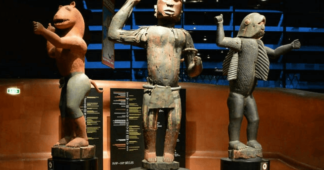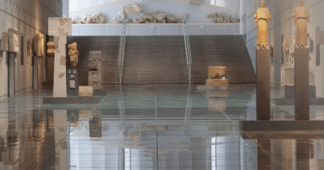“A high-priority cultural policy”: The German Lost Art Foundation is hosting a conference on looted art and the restitution of colonial objects.
Dec 05, 2021
“As we engage with museums in a colonial context, we face the reality that historical trauma and contemporary trauma coexist because the result of that ‘hewa’ (sin), the wrongfulness of the original theft, persists,” said Noelle M.K.Y. Kahanu during the German Lost Art Foundation’s conference in Berlin about the return of collection items from colonial contexts. But the seed for their return lies in the moment of their theft, the University of Hawaii scholar said.
The three-day online conference featuring more than 40 scholars and experts from all over the world started with a conciliatory mood, albeit thought-provoking, with words that show how deep the loss of cultural heritage weighs even today.
Over the centuries, a number of objects from Hawaii have found their way to Europe in an illegal context, including sacred objects and human bones.
Only slowly are restitution and repatriation requests yielding results.
In October 2017, the Staatliche Ethnographische Sammlungen Sachsen ethnographic collections restituted human bones to descendants from Hawaii — after 26 years of unsuccessful repatriation requests from the Hawaiian side.
The long path to restitution
The participants in the conference, more than 40 scholars specialized in the field, are examining why there are still so many unanswered questions after all these years. The discussions look into the history of the artifacts and their unfair acquisition, trace the disputes between the museums and the societies of origin and discuss what the “homecoming” of human bones or cultural objects can mean for societies.
The debate is very welcome and long overdue, according to Hermann Parzinger, director of the Prussian Cultural Heritage Foundation.
“The question of decolonization is definitely not just a question for museums. It’s a challenge for our entire society and for many other institutions that were also affected by it,” he said at the opening event.
Processing the colonial past
A few “historic milestones” have been reached in coming to terms with German colonial history, said German State Minister for Culture Monika Grütters, listing the return of the whip and the Bible of local folk hero Hendrik Witbooi to Namibia and Germany’s commitment to restitute the so-called Benin bronzes to Nigeria beginning in 2022.
“The matter must and will continue to be a high priority for cultural policy, also and especially here in Germany,” she said at the opening of the conference.
Grütters added that the process of coming to terms with the colonial past is still in its infancy in Germany, both on a political and a social level.
That includes funding of the Magdeburg-based German Lost Art Foundation, which is hosting the conference. So far, the center supports 40 projects with about €4.4 million ($5 million).
One focus of the conference will be the debate surrounding the return of cultural objects from sub-Saharan Africa — 80% to 90% of its cultural heritage is estimated to be in Western museums.
During the colonial era, many pieces were acquired illegally and ended up in European collections. For some years, European museums have shown an awareness for the matter, but it was a long way before Europe was willing to talk about restitution.
As long ago as in the 1870s, Ethiopia demanded restitution, among other things of sacred objects, said Wolbert G.C. Smidt, who teaches at Friedrich Schiller University in the eastern German city of Jena and at Mekelle University in northern Ethiopia.
Only few items were returned, which for Ethiopia “equated de facto to undermining Ethiopian power,” Smidt said.
The lessons to be learned from failed restitution requests will be one of the topics of the conference’s closing event on Friday. It already seems clear that much remains to be done to come to terms with the colonial past.
This article has been translated from German.
Pubkusged at www.hindustantimes.com
We remind our readers that publication of articles on our site does not mean that we agree with what is written. Our policy is to publish anything which we consider of interest, so as to assist our readers in forming their opinions. Sometimes we even publish articles with which we totally disagree, since we believe it is important for our readers to be informed on as wide a spectrum of views as possible.











